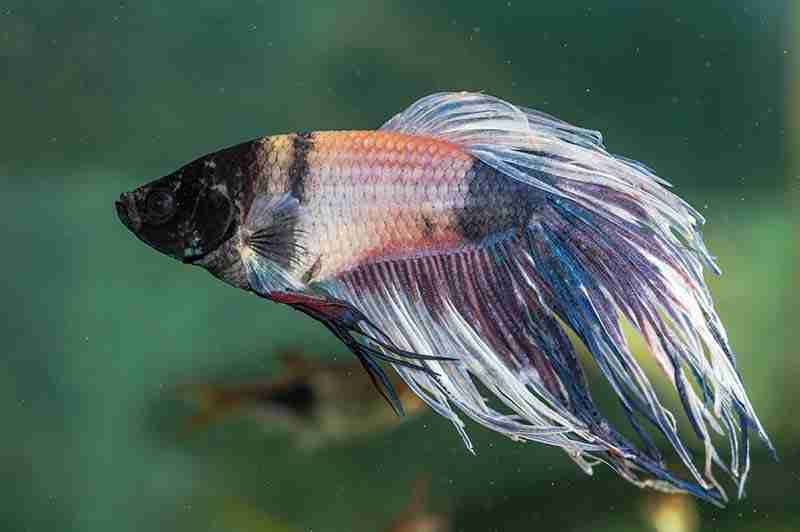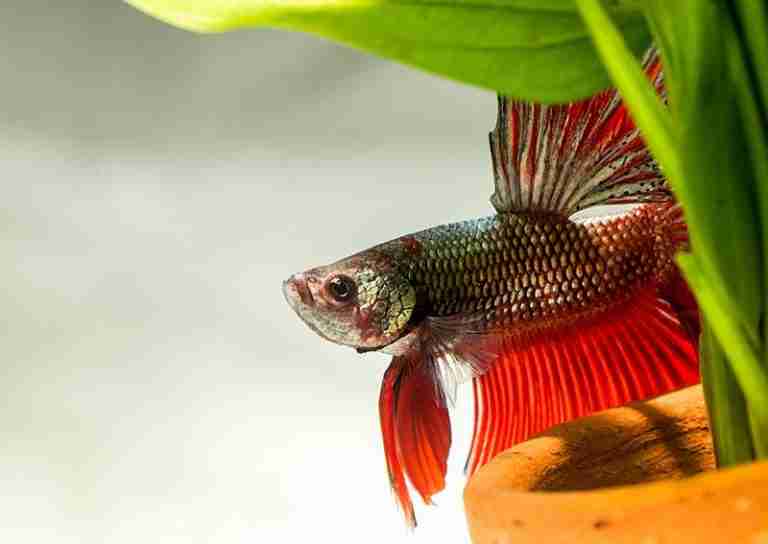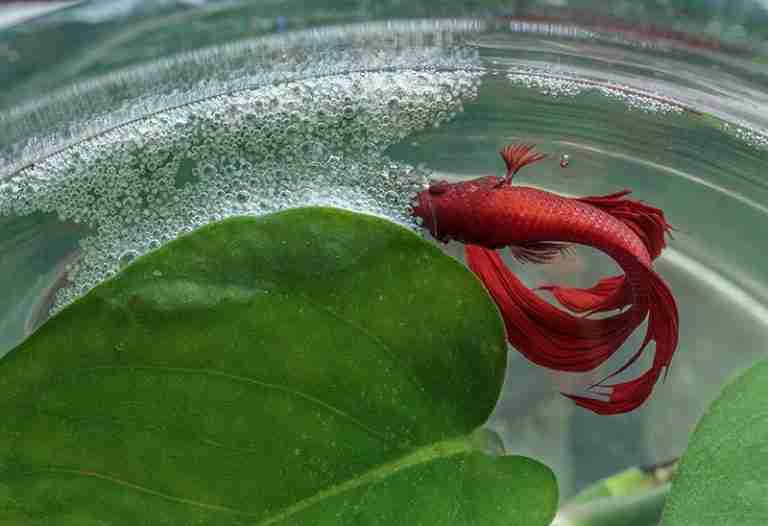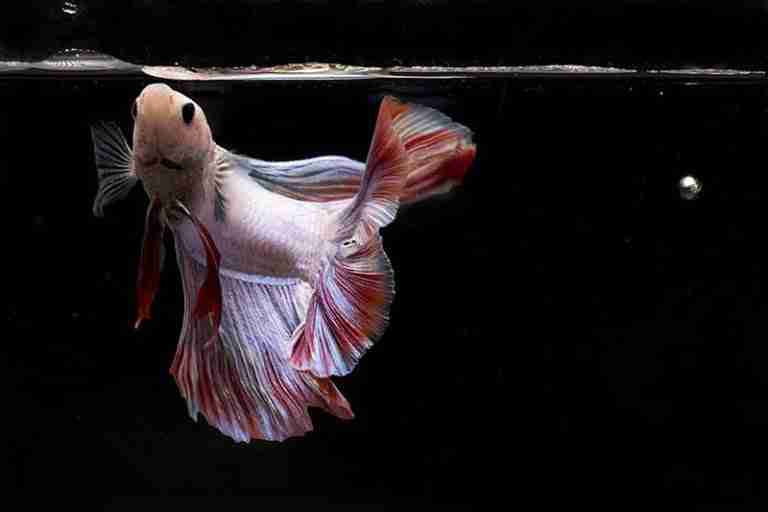How To Tell If Your Betta Fish Is Dying Of Old Age
Betta fish typically live for 7 to 10 years, and you will undoubtedly form a bond over this time, but sadly they can’t live forever. As your betta fish gets old and approaches the end of their life, there will be a time that you need to say goodbye. But when? This guide helps explain how to tell if your betta fish is dying of old age.
The most common signs that your betta is dying of old age are lethargy, decreased swimming ability, reduced appetite, and slowed breathing. You may also notice a decreased response to stimuli like sound or motion. If you notice these symptoms along with physical signs of aging, it may be time to say goodbye.
You can tell your betta is getting old by looking at its scales. Old age causes the scales on your betta’s body to grow thinner and less vibrant in color. As well as this, the fins of an older betta may become tattered or torn due to infirmities of age.
These changes in appearance are how you’ll know that you have an old betta fish, and it may soon be time to say goodbye to your beloved pet. There is no cure for old age, but there are ways to improve the quality of life for your betta.

Make sure to read the rest of this article, as I’ll cover each section below in more detail.
1. What is aging in fish
2. Signs that your betta fish is aging
3. How to improve the quality of life for your betta if they’re aging
4. Betta fish behavior before death.
5. Tips on how to say goodbye to an old betta
Make sure to check out our guide to betta fish care.
What Is Aging In Fish
Aging in fish is difficult to identify because it doesn’t always have the same symptoms in every species.
All fish will have an average lifespan that can vary, depending on whether they are brought up in captivity or the wild.
It is important to familiarize yourself with how old your fish will generally live since you wouldn’t want to keep it for much longer than usual as they would likely be in pain and discomfort.
I’m sure you are likely aware of your betta’s age, but if not, how old is your betta?
How Old Is My Betta Fish
If you know how old your betta fish is, you will be better positioned to understand if it’s suffering from the downturn caused by old age or some form of illness.
Often, fish that are brought up in captivity will usually live a shorter life compared to those that live in the wild, however, this is not often the case with bettas.
It is not easy to establish a betta fish’s age exactly, so you will be better off finding its age when you purchase it.
There are a few signs that your better is nearing later life, which will help to provide a rough age (within a few years), but this is not very useful, especially when they can live for quite a few years.
If you want to guess your betta fish’s age, the best way is to look at it visually for signs of color fading, tatty fins, and scales. Also, your betta may be less alert and uninterested in food. These are all signs of older age, and the changes are not sudden but instead very gradual.
Any sudden changes in your betta fish could signal disease or illness, which must be investigated further.

How Long Do Betta Fish Live
Betta fish typically live for 3-5 years, depending on their environment. Betta fish in captivity tend to have a longer lifespan than those in the wild. Betta fish in the wild have many predators to fend off, and water conditions are less favorable.
Let’s take a look at the differences and find out why bettas don’t live as long in their natural habitat.
Betta Fish Age In The Wild
In the wild, betta fish have the potential for a long lifespan, but in reality, many only live for around 1-2 years. There are several reasons for this which I will touch on below.
Betta fish are native to Southeast Asia and live in shallow, stagnant ponds and slow-moving rivers. They have a labyrinth organ to breathe air from the surface, which is how they can survive in poor water conditions.
Betta fish are also known as Siamese Fighting fish because of their aggressive nature toward each other. Male betta fish are very territorial and will fight (often to the death), which profoundly impacts their potential lifespan.
Fish are very sensitive to their environment, and unless you have established a tank that very closely mimics your fish species’ natural habitat, they will often suffer from stress to some degree, will not get the type of diet they require, and suffer from illness or disease brought on by poor water conditions.
Betta Fish Age In Captivity
Bettas live much longer in captivity because of better living conditions than those found in the wild.
The average lifespan of a betta raised in captivity is 2-3 years but can extend up to 5 if cared for well and in the right conditions. Some betta fish have lived up to 7 years, with one report of a 10 year old betta!
Betta fish may live for many years. Although betta fish are generally purchased when their beautiful fin plumage has fully matured, they are frequently sold once their gorgeous fin plumes have developed. Adult bettas will look their absolute best and will be less prone to stress and disease in a new environment if transported as adults.
A male betta’s fins are usually developed after 1 year, so the fish you have bought will likely already be a year old. Female betta fins are not quite so extravagant and are often developed within 6 months and will be sold from this age.
It is always wise to ask how old any fish is before purchase, but often the retailer won’t know the answer or may only give a rough guide.
You can assume that a fully developed betta will be either 1 year or 6 months old on purchase.
Signs That Your Betta Fish Is Aging
There are many health issues that older bettas can suffer from that you wouldn’t necessarily expect to see in a young, healthy betta. You cannot always see these ailments, but you may notice changes in their behavior.
Like people, animals can suffer from organ failure in old age and generally poor health because immune systems may begin to fail.
Some ailments to be aware of are:
- Kidney failure (Dropsy) – Quite common in old bettas and can show itself in several ways, such as fluid retention and lethargy. A build-up of fluid can make your betta swell up and look bloated. Pine coning scales (scales that stand out from the body) may be noticeable, along with skin lesions.
- Bacterial Infection – All fish are susceptible to bacterial infections, but old bettas can be more prone to them with a weakened immune system.
- Swim bladder problems – The swim bladder affects buoyancy, and your betta cannot swim well without it.
- Betta Fin Rot – A skin infection affecting fins and scales, often brought on by fighting, but a lowered immune system can be to blame.

All sickness needs to be taken seriously because the cause of the illness may not be due to old age. An old betta will generally exhibit a very gradual change in its health, slowing down over many months.
Here are some other factors that you can take into account when deciding if your betta is getting old:
- General behavioral changes – As betta fish get old, they are much less curious and much less aggressive. Aggression is often a territorial behavior seen in younger betta fish that are sexually active. Betta fish are often mellow in their old age, so you may notice decreased flaring and other aggressive behavior.
- Lack of alertness or decreased response to stimuli – An older betta may be less alert or show decreased response to things happening around it. Betta fish are quite intelligent and will respond to many stimuli, such as sounds or motions.
- Mobility – How fast they swim and how much exercise they get. An older betta will be less active and may not move around as much.
- Eyesight and slow reactions – How well can your betta see objects in the tank? Eyesight and sensitivity to objects may reduce with age.
- Signs of aging in your betta’s scales – Older scales are thinner and more transparent. They will be a slightly lighter color and will lack the vibrancy that younger fish have.
- Tattered or torn fins – Fins of older fish may become tattered or exhibit tiny tears for no obvious reason.
- Loss of appetite – As a fish’s body starts to slow down, it won’t need as much food.
- Frequent breathing – If you notice your betta breathing faster or more frequently, and your tank’s water parameters are within an acceptable range, this could be a very bad sign that your betta may be close to death.
- Frequent sleeping – Your betta may take frequent naps later in life.
- A hunched back – As betta fish begin to age, a hump will sometimes form along their back, giving your betta a hunched appearance.
- Stops making bubble nests – Another sign that a betta is getting old is if they stop making bubble nests. Old betta fish are less likely to show signs of sexual interest, such as building bubble nests.
A betta that shows many of the signs listed above is most likely reaching the last few weeks or months of its life. Many of these signs, especially when combined, are often linked to aging and can be warning signs that it’s soon time to say goodbye.
That being said, you shouldn’t assume that a sick fish is always age-related. If your betta doesn’t show other symptoms of aging, a sick betta is often treatable and may live many more months or years.
How To Improve The Quality Of Life For Your Betta If They’re Aging
If you have established that your betta is starting to wind down, it would be best to ensure they have the best possible quality of life in their final months.
The following are some ways you can do this:
- Provide them with a comfortable betta tank, big enough for them to swim freely.
- Avoid poor water quality. Keep the water clean at all times by removing waste regularly and not overfeeding your fish.
- Lower the water level so it’s easier for your betta to take air from the surface when needed.
- Provide your betta with hiding places to ensure their comfort.
- Don’t put them with other fish that may bully them.
- Make sure that they have adequate filtration and a heater.
- You can also give your betta some treats from time to time that will improve their quality of life, such as live foods or vegetation.
- Keep track of how long your betta has been alive and how old they are; this way, you’ll know when it’s time for them to go.
You can say goodbye to your aging betta in many ways, and by following these tips, you’re sure to say goodbye with dignity to your aging pet.
How To Tell If Your Betta Fish Is Dying Of Old Age
Betta fish often exhibit certain behaviors before death, like any other fish and living creatures.
If you are certain that your betta is old, it is best not to intervene in these last stages of your betta’s life and instead just keep them as comfortable as possible.
A few examples of betta fish behavior before death are:
- Complete lack of interest in food.
- Swimming sideways or upside down.
- Your betta may stay at the top of the tank constantly.
- Your betta may sit or lie at the base of their tank.
- Breathing will increase rapidly as organs begin to fail.
- Color may fade from them due to a lack of oxygen.
You will probably notice that your betta fish is peaceful now. The death process can be slow, but it is natural to happen when your betta is ready.
How Do You Know If Your Betta Fish Is Suffering
It’s important to make sure your betta fish is comfortable and not suffering in its final days or hours. It’s commonplace to put down a suffering animal, and it should be the same for a fish.
If you have had your betta for a long time, you will know its natural behavior and when it’s unwell. A peaceful betta fish will usually sit still or hide somewhere quiet, but when it’s suffering or in pain, your betta will dart around the tank, often swimming into objects that may cause injury.
If your betta is struggling to swim due to swim bladder disease, which I discussed earlier, or they are just too weak, it is likely to cause distress and suffering. You can try turning down the filter flow to reduce the current or switch it off altogether.
If your betta is suffering due to the complication of infection or illness, it may be more humane to consider euthanizing your fish. Find out how to euthanize a betta fish humanely and painlessly to avoid any needless suffering.
Wrap Up
Many fish owners will not care too much about the finer points of their betta’s life and health and will wait until they float to the top of the tank before removing and disposing of them. Some owners will be more in touch, feel more connected with their betta, and want to provide them with the best final stages of their lives.
Whichever type of owner you are, it is always good to know if your betta fish is old or young and whether an illness is preventable and treatable or more likely because of old age.
Bacteria or parasites in your betta tank may infect other fish or live plants and can be avoided. An old betta may be susceptible to very low levels of bacteria which are harmless to other, younger fish.
I hope this post has given you a few helpful pointers on the signs of old age in betta fish and how to tell if a betta fish is dying of old age.
As pet owners, we should all want to do the best we can for whatever pet we own, and this should be especially true at the end of their lives.







